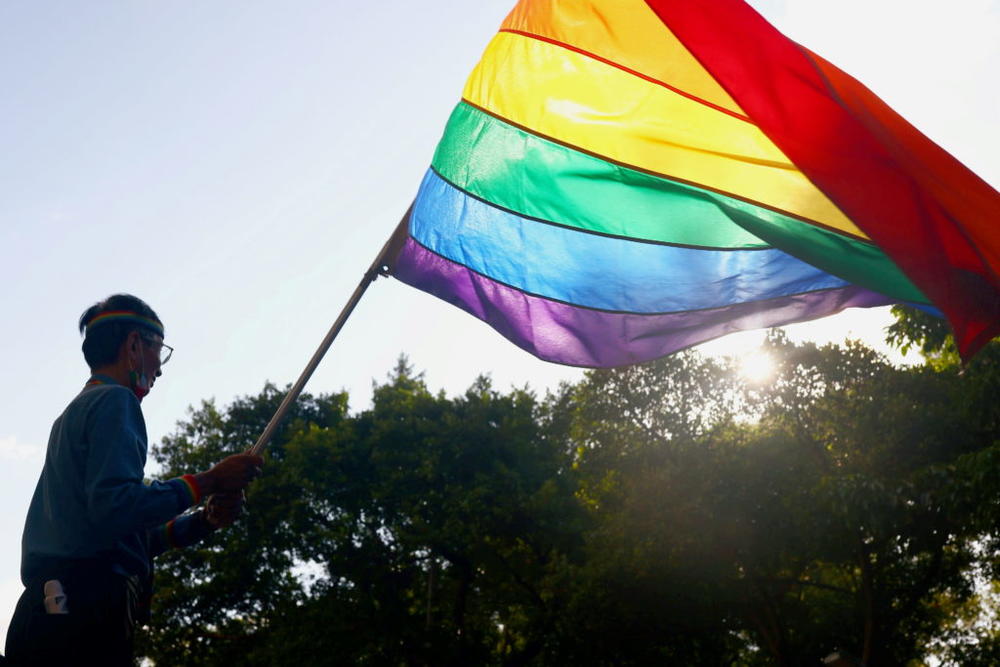
Section Branding
Header Content
Georgia Today: Fulton cleared of election fraud; Medical cannabis update; Mama Bears documentary
Primary Content
On the Tuesday, June 20 edition of Georgia Today: Fulton County is cleared of any violations regarding the 2020 election; there's a medical cannabis update for Georgia; and we talk with the filmmaker behind a new documentary focusing on a group of Christian parents who became LGBTQ activists.

Peter Biello: Welcome to the Georgia Today podcast from GPB News. Today is Tuesday, June 20. I'm Peter Biello. On today's episode: After a nearly two-year investigation, Fulton County is cleared of any violations regarding the 2020 election; a first for Georgia when it comes to medical cannabis; and I'll talk with the filmmaker behind a new documentary focusing on a group of Christian parents who became LGBTQ activists. These stories and more are coming up on this edition of Georgia Today.
Story 1:
Peter Biello: The state election board is ending its investigation into alleged violations by election workers in Atlanta's Fulton County. The state board voted unanimously today not to take over the local board, clearing it of charges that fanned conspiracy theories since the 2020 election. State Board Chairman Bill Duffy said the nearly two-year-long state probe nonetheless found significant problems.
William Duffy: The existence of the performance review helped incentivize Fulton County to make improvements to their elections, but it took an enormous amount of donated work and it's difficult to see how it is a sustainable process.
Peter Biello: The investigation sparked fears of partisan meddling in the state's most populous county, a Democratic stronghold.
Story 2:
Peter Biello: A former Augusta City commissioner has been sentenced to prison after being found guilty of destroying records in a federal investigation and then lying about it to federal agents. A judge ordered Sammie Sias to serve three years in prison and pay a $5,000 fine. Sias deleted thousands of files minutes after being subpoenaed for bank records. The subpoenas were part of an investigation into how taxpayer dollars were being spent at a community center tied to the former commissioner.
Story 3:
Peter Biello: Georgia is becoming the first state in the nation to distribute medical cannabis through independent pharmacies. GPB's Donna Lowry reports.
Donna Lowry: Thousands of Georgians seeking access to medical cannabis for everything from Parkinson's disease to seizures will soon be able to purchase it in more places. Right now, medical cannabis is only available through state-licensed providers in larger cities. Lawmakers wrote Georgia's law to focus sales through so-called mom-and-pop independent pharmacies rather than chains. Georgia Access to Medical Cannabis Commission executive director Andrew Turnage:
Andrew Turnage: Pharmacies are already serving in that trusted role. Patients go to the pharmacy to find the health care that they're — they're relying on right now. So they have that relationship with these locally owned pharmacists.
Donna Lowry: The 700 independent pharmacies across the state can begin applying for occupational licenses to distribute cannabis oil this week. It should be available to them by the end of the year. For GPB News, I'm Donna Lowry.

Story 4:
Peter Biello: Georgia's U.S. Sen. Jon Ossoff introduced bipartisan legislation last week that would allow junior enlisted military personnel to receive a higher housing allowance. Ossoff led an eight-month investigation last year that called attention to the poor condition of privatized housing at the Army's Fort Gordon near Augusta. The bill would require a more flexible housing allowance. The military is currently not permitted to take local housing costs into account when determining housing allowances for junior enlisted personnel.
Story 5:
Peter Biello: Georgia passed a law called the Mental Health Parity Act last year, promising a stronger social safety net for people with acute and sometimes dangerous mental health issues, but who potentially lack health care coverage. One year later, the law is providing a framework for change, even if some say real progress is still waiting. GPB's Ellen Eldridge reports.
Ellen Eldridge: Mental health crisis centers are like emergency rooms for people detoxing from drugs or considering suicide. 24 hours a day, seven days a week, people can find help.
Crisis center worker: Knock on the door.
Ellen Eldridge: At places like the Behavioral Health Crisis Center in Athens.
Justin: My name is Justin. Welcome to the Advantage Crisis CSU.
Ellen Eldridge: Anthony Long is the crisis Center director. He leads a tour of the 23 bed facility, pointing out what he calls behavioral health furniture.
Anthony Long: The rooms are definitely secure because the beds are bolted to the ground, and then also our nightstands are bolted to the ground, as well as our little dresses that we have on the wall for their personal belongings.
Ellen Eldridge: The atmosphere is impersonal and clinical, but everything is designed for patient safety. And facilities like this save lives.
Anthony Long: They are specifically designed to break away because, you know, you may have clients that are more severe, that may try to hang themselves or things like that.
Ellen Eldridge: Anyone, regardless of their income or insurance coverage, can be seen in one of these centers. In 2022, Georgia passed a law called the Mental Health Parity Act. It authorizes studies of how the state could and should pay for more of this critical mental care. Kevin Tanner leads the State Department of Behavioral Health and Developmental Disabilities. During a conference earlier this year, he said one study shows the state has a severe shortage of mental health crisis care workers and that current workers should have their salaries increased.
Kevin Tanner: And it shows that it's close to a 40% increase is warranted. So we're looking forward to working closely with the General Assembly next session to see if we can get that funded. The state portion of that will be around $107 million annually. So it's — it's a lot of money.
Ellen Eldridge: It works out to about a 60% increase in what the state currently pays behavioral health workers. Tanner says DBHDD is looking for more ways to retain workers. But for now, the department can't staff the facilities it has.
Kevin Tanner: And Augusta has a 16-bed crisis center. Because of workforce shortages there are only — they only have eight of those beds open, so the whole system's clogged.

Ellen Eldridge: While Gov. Brian Kemp okayed an increase in pay for all state employees this year, he paused $4 million set aside explicitly for mental health care workers. State legislators budgeted another $24 million for mental health crisis beds in Augusta, Fulton County and Dublin.
Kevin Tanner: These are our bed needs. Our crisis beds, our IDD beds, our step down beds, our detox beds for the next decade and where they need to be located in the state. So we can be very clear on what funding — funding options that we need available to the department.
Ellen Eldridge: Kemp is also asking the department to hold off on spending that money, too. DBHDD says the governor wants to see more explanation of why the new beds are needed, which is expected to be complete by September. Kim Jones is executive director of Georgia's chapter of the National Alliance on Mental Illness.
Kim Jones: We're concerned about the cuts, obviously. We are in a what we consider an epidemic of a pandemic for mental health. And we know that the suicide rates for children are going up. And to cut funds in this area right now are devastating to us.
Ellen Eldridge: So far, the Parity Act is performing as promised by building the framework to spend new money on mental health care. The millions for more crisis beds could be restored when the governor releases his midyear spending report in January. Meanwhile, the state still has billions in budget surplus. For GPB News, I'm Ellen Eldridge.
Story 6:
Peter Biello: Aircraft engine manufacturer Pratt and Whitney plans to expand its production facility in Columbus. The Connecticut-based company today announced a $200 million expansion at its Columbus engine center. The move is expected to create 400 new jobs. Pratt and Whitney officials and Gov. Brian Kemp jointly announced the expansion at the Paris Air Show.

Story 7:
Peter Biello: An Atlanta actress and writer wants to become the first Black woman to be president of SAG-AFTRA, the union that represents film and television actors. GPB's Amanda Andrews has more on the launch of her campaign.
Amanda Andrews: Maya Gilbert-Dunbar has been a member of SAG-AFTRA and the Writers Guild of America for over 15 years. Writers for the entertainment industry are the latest group to demand better working conditions. Union writers with the WGA began a strike May 2 and SAG-AFTRA members could strike next if an agreement isn't reached by June 30. Gilbert-Dunbar says as union president, she would address the disconnect between current union leaders' actions and members' needs.
Maya Gilbert-Dunbar: There is an attempt to continue to keep membership inactive so that a small group can control the entire direction of the union. And that's why I want to step up and I am getting involved now.
Amanda Andrews: Gilbert-Dunbar has until July to get enough votes to qualify for the nationwide vote in October. For GPB News, I'm Amanda Andrews.
Story 8:
Peter Biello: One of Georgia's largest arts organizations, has named new leadership. Atlanta's Alliance Theater announced today Tinashe Kajese-Bolton and Christopher Moses will take over as artistic co-directors. Each individually has served the organization as associate artistic director, and together they've been leading the theater as interim co-director since last year, when longtime leader Susan Booth left the Alliance to lead a theater in Chicago.

Story 9:
Peter Biello: Every summer, the Georgia Department of Natural Resources sees an increase of nuisance calls about geese. GPB's Devon Zwald explains why.
Devon Zwald: In June, Canada geese in Georgia shed in regrow their flight feathers in a process called molting. Kaitlin Goode is the urban wildlife manager for the State Department of Natural Resources.
Kaitlin Goode: This time of year, geese just kind of hang around because they can't go anywhere, right? Even if they're hazed or harassed, there's really no place for them to fly off to because they can't fly. So they're just kind of stuck wherever they end up molting.
Devon Zwald: To deter geese from your property, she suggests avoiding nests, scaring the geese away, or putting up barriers. But mostly, she says, it's important not to feed the geese.
Kaitlin Goode: Once we start handing out food to wildlife, they lose that fear of people, and they're more likely to end up either hit by a vehicle or killed for conflict reasons.
Devon Zwald: She says the molting period will mostly be finished around July 1. For GPB News, I'm Devon Zwald.

Story 10:
Peter Biello: A new documentary tells the story of a group of mothers whose children challenged their views on what it means to be gay or trans. These mothers went on to become Mama Bears, that is, advocates for LGBTQ people, especially those whose parents have disowned them for who they are. Daresha Kyi of Atlanta is the director of this documentary called Mama Bears, and she's with me now. Welcome to the program.
Daresha Kyi: Thank you so much. I'm happy to be here.
Peter Biello: So what made you want to take on this subject in a documentary?
Daresha Kyi: I read about the Mama Bears through an article on Kimberly and Kai and their fight for Kai to use the girls bathroom in Portland, Texas.
Peter Biello: You're talking about Kimberly Shapley, whose daughter Kai is trans.
Daresha Kyi: Yes. And Kimberly mentioned that she had found the strength to go from being a Tea Party Republican to an LGBTQ activist and ally through the mama bears, through the support of the Mama Bears. For me, that process is heroic because I know I knew instinctively that, you know, these women, when they would take that journey, they might lose family, they might lose friends, they might. They definitely are going to lose their congregation or their church community. And so they literally go through the dark night of the soul and then they come out and they are bad, bad to the bone.
Peter Biello: And Kimberly Shapley is one of the three moms profiled, and she says she lost a lot of family over her embrace of her trans daughter. But she also gained some family, a chosen family. And that's a thread through this film that you gain a community even when you lose so much. And what you gain in that community is in part, the mama bears.
Daresha Kyi: There is this concept that runs through the film of Chosen Family. These are the people who love you, even though they're not blood. These are the people who stand by you and stand up for you. And so the mama bears create their own family with each other and with the LGBTQ community and with any allies who stand with them.
Peter Biello: Mm hmm. And one of the moms here, Sarah Cunningham, she goes on tour essentially, and starts giving out free Mom hugs the hugs in a way that she wishes she had given her son Parker, who came out as gay, and she resisted the fact that Parker was gay. And so she goes on tour.
TAPE - Sarah Cunningham: Would you like a hug or a high five?
Peter Biello: So in this scene and it's a little hard to hear, she's going through a crowded bar, the Stonewall Inn in New York City, and she's giving out hugs. And as she's hugging people, one person says to her, it's my first Mother's Day without her. And all those little blips we're hearing, but we can't really see on the radio. These are tweets popping up on the screen. And one of those tweets says, that's the love of Jesus. How did you feel filming these scenes?
Daresha Kyi: Well, Sarah was the first person that I actually filmed with. The first thing we filmed was the — her and her friend Laura Beth at the Home for Hope in Philly when they were feeding the LGBTQ homeless or unhoused people in the shelter. And I once I met her, I just knew that her story was probably one I was really going to focus on. So that was the first thing we shot. And then the next day they were going to Stonewall Inn to give out hugs. So I was really excited about filming with them.
Peter Biello: The people you interviewed for this film were all Christian and to varying degrees, struggling with either being part of the LGBTQ community or having a loved one, a child who is part of that community and wrestling with their faith, which told them that being part of that community is wrong, is in the wrong path and there's something wrong with you. What did you learn from these people about the nature of that struggle between two things that are so essential to what it means to have an identity, right? Your religion and also your sexual orientation, your community?
Daresha Kyi: You know, when I first started the film, I had some ideas about who this community was and how these people thought and and what motivated them, and I really couldn't understand. I could not wrap my head around some of the things that parents do. Like, how do you kick your kid out of the house because they're gay? How do you write them out of the will, all these very harmful things? How do you put them in conversion therapy, which psychiatrists have said is very harmful, right? And so I just didn't understand that a lot of these parents are operating from what they think is love. If you believe, as many evangelical conservative Christians do, that there is a place called hell and that homosexuality or, you know, any — pick someone on the spectrum of the LGBTQ community — if you're any one of those, you are committing one of the worst sins possible, a mortal sin. And it's going to condemn you to hell for all eternity. So if that's what you believe and you see your child headed down this pathway, then it's your job as a parent to stop them, to do everything you can to save their soul. Those are really high stakes, you know what I mean? They really don't get any higher than saving someone's soul. So if that's what you're operating from, then it's going to motivate you to do the kind of things that these parents do. So learning that and understanding that mindset gave me a lot more compassion and understanding for this particular community. The other thing that was really helpful was talking to a gay man and he told me, "You know, it took me 20 years" — or I don't know how many years he said — but "it took me a long time to come to terms with my sexuality. Why would I expect my parents to come to terms with it overnight?"
Peter Biello: Is there an organized religion that folks like Kimberly and and Sarah can go now, that are openly welcoming of of LGBTQ folks?
Daresha Kyi: There is a movement within Christian churches to become more affirming. I can't tell you exactly where people can go. I can tell you that on the Mama Bears' website, which is realmamabears.org, there are a lot of resources and some of those are churches, but there's also health, mental health resources. There's also financial — just all kinds of resources for the LGBTQ+ community. And when we get the money to revamp our website as part of our impact campaign, we will have a lot more resources and we will have videos that touch on different aspects that are not in the film. For example, we will have a — videos from clergy. There are no clergy in the film, but I did interview about 12 different pastors who were evangelical or conservative Christians who became affirming.
Peter Biello: Well, Daresha Kyi, thank you so much for speaking with me about your film. Really appreciate it.
That is it for this edition of Georgia Today. If you want to learn more about these stories, visit GPB.org/news. And don't forget to subscribe to this podcast. We'll be back with you in your podcast feed tomorrow afternoon with more of the top stories from the Peach State. And if you have feedback for us, we'd love to hear it. Email us. The address is GeorgiaToday@GPB.org. I'm Peter Biello. Thanks again for listening. We'll see you tomorrow.
___
For more on these stories and more go to GPB.org/news.
Also, GPB's Georgia Today newsletter hits your inbox on Tuesdays, Wednesdays and Thursdays with top stories from around the state featuring news, politics and more. Subscribe here.



